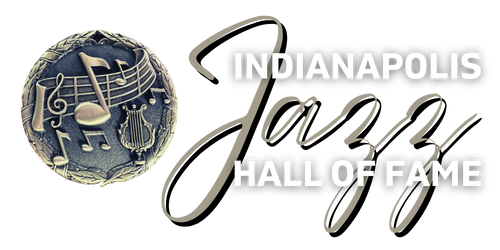
Eugene Fowlkes
Trombonist & Bassist
Inducted into the Indianapolis Jazz Hall of Fame in 1999
Eugene (Gene) Augustus Fowlkes
(1930 – February 25, 2005)
Gene Fowlkes grew up in an African American neighborhood on the Eastside of Indianapolis where he went to public schools 56, 37, and 26 before attending Crispus Attucks High School. As a child, Gene was intrigued by his oldest brother’s trombone, but his arms were too short to play the instrument. “That could be the reason that later on I just decided to get one [of my own]. I went to Sack’s pawn shop that was on Indiana Avenue . . . bought a trombone for either $50 or $75.” That was in 1947.
Gene’s first musical influences were the well-known trombonist, J. J. Johnson, and Johnson’s wife Vivian. It was Vivian who introduced Fowlkes to Johnson’s recordings and the stories of their lives in New York City. When Gene began to play his pawn shop trombone, he practiced by playing along to J.J.’s recordings loaned to him by Vivian. He played those 78s so much he wore deep grooves in them. But playing trombone turned Gene’s life around. “I don’t guess I was pretty much no different than the 17, 16… 17 year-old kids now, just want to hang out. Then I heard about the Hampton family. Now that was the turning point of my whole life.” How’d you hear about them? “I went over to McArthur’s Conservatory of Music (on Indiana Avenue) that’s how I met the Hamptons.”
Gene paid for his lessons at McArthur’s with his G.I. Bill, a benefit he received at an early age. At the end of World War II, Gene enlisted, faking his age. When his mother sent the Commander Gene’s birth certificate showing he was only 16, he was sent home. But his benefits kicked in anyway affording Gene a chance to train at the premier music school in Indianapolis. Soon he started hanging out with Buddy Montgomery at Wes Montgomery’s house on Cornell Street in Indianapolis. “So between the Hampton family and Wes Montgomery, Buddy, and Monk . . . I just fell in love with jazz,” he says.
Because the trombone was not an essential instrument in most jazz groups, Fowlkes rarely had a steady job in a house band, but he stayed relatively busy playing in quintets or larger groups whenever he could land a gig. His work ethic matured when he started at the Cotton Club in Cincinnati. There he played in a group that also included left-handed trombone player Slide Hampton (of the Indianapolis Hampton family). “I remember one morning in particular . . . I heard him practicing and I was so inspired. Now, here’s a guy that played better than me, now he’s up practicing, I’m laying in the sack. So I got up, shook my head and put my clothes on and went down and I started practicing.”
When Gene returned from his second stint in the armed forces--this time he was drafted--he got a job at the Turf Club at 16th and Lafayette Road. Drummer Sonny Johnson formed a group with tenor saxophonist “Pookie” Johnson, Monk Montgomery, on the just-introduced electric Fender bass, Gene Fowlkes on trombone, and Carroll DeCamp on piano. It was a “wonderful, wonderful gig.” Unfortunately for Gene, Sonny Johnson eventually decided to change the group. He "fired" Carroll DeCamp and replaced him with Buddy Montgomery, “fired” Gene and replaced him with guitar phenomenon, Wes Montgomery. The new Johnson-Montgomery Quintet became the hot jazz band in Indianapolis. "For people old enough to remember what that group was, you know, and how they sounded, man that was really good,” Gene says years later, despite his own bad luck in situation and an intervening period of admitted sour grapes. The change in band also made the two outcasts, DeCamp and Fowlkes great friends with a shared disappointment, both in losing their jobs and knowing how much better the group was after they were kicked out. “We talked about them like dogs,” Gene says with a laugh. But even the outcasts knew there was something very special in the chemistry of the Johnson-Montgomery quartet.
After losing that job at the Turf Club, Fowlkes went on the road with Jimmy Coe, Earl Van Riper, Mingo Jones, Earl Fox Walker and Bill Boyd in Indianapolis band leader Jimmy Coe’s band. They were the opening act for an all-black group with a rock-and-roll hit. Gene no longer remembers the name of that band nor their song. But he’ll never forget the dismal segregation of the South. He saw first-hand separate water fountains, separate lines at ice cream stands, and when they played in Dallas, Texas, “There was one big rope tied right down the middle of the room. The blacks on one side and the whites on the other side. You couldn’t cross the line.”
In 1957 Gene fell in “LUV” [his pronunciation and emphasis] and passed up the opportunity to go on the road with the Lionel Hampton group. Instead he got married and took a factory job at Western Electric. He didn’t give up music but about that time he decided to switch from the trombone to the bass, figuring he could find more work on the weekends as a bass player. Because both instruments are in the bass clef he didn’t have a problem reading the bass part; says he had to slow his mind down for the bass, because the trombone “is faster and quicker.” He learned the new instrument from other bass players in town at the time, several of whom went on to make very big names in much bigger cities: Leroy Vinnegar, Larry Ridley, Monk Montgomery, Philip (Flip) Stewart. A bass player from Detroit, Bill Yancy, who was playing at George’s Orchid Bar on Indiana Avenue, taught Gene the correct hand positions, which made him a much more controlled player. He was no longer “just grabbin’” at his new instrument.
As a bass player Fowlkes worked with Wes Montgomery whenever Monk was out of town and went on the road with the famous Earl “Fatha” Hines. Though a testament to the skill he had developed, that road trip also turned Gene away from his musical career. Earning $400 a week in the late 1970s, he found it nearly impossible to live in Los Angeles and make enough money to pay his mortgage in Indianapolis. He says he barely managed to pay his dog food bills to fellow musician Claude Sifferlen, who was dog sitting for the recently divorced Fowlkes.
Tired of hiding from bill collectors, when Gene returned to Indianapolis, he took a full-time job with the CETA program in the purchasing department at the City/County Building. While there he saw a posting for a position as a correctional officer. It paid $12 an hour, so he decided that would be his next job. On his first day of work at the Indiana Youth Center in Plainfield, he “saw so many of my old buddies. Boy it was like old home week.” When he found out he could be a parole officer if he earned 15 hours of college credit, he completed an associate degree, and began to look for a new position. Never one to believe that racial discrimination held him back, Fowlkes plainly states that it was age discrimination, not his race, which prevented him from finding a position as a parole officer. But he continued to work in the corrections field and eventually retired at age 62 from his job at the men’s work release center. During these years of working the midnight shift in corrections, Gene had to give up playing gigs. Although he missed it for a long time, he loved staying home with his dog, Sheba, growing flowers, playing music, and he keeps the remote control “duct-taped” to his wrist so he can stay up-to-the-minute on sports.


